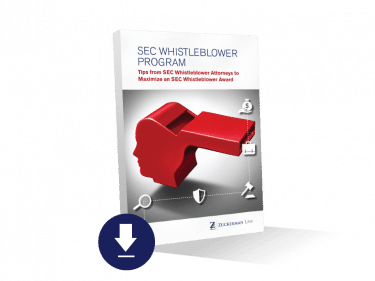Leading SEC whistleblower attorney Jason Zuckerman was interviewed by Advisor Hub, a publication covering the wealth management industry, about a forthcoming announcement by the SEC of what will likely be the largest SEC whistleblower award, stemming from a $267 million enforcement action against JPMorgan for failing to disclose conflicts of interest to clients. According to an SEC press release announcing that enforcement action, JPMorgan investment advisers “preferred to invest clients in the firm’s own proprietary investment products without properly disclosing this preference . . . [which] impacted two fundamental aspects of money management – asset allocation and the selection of fund managers – and deprived JPMorgan’s clients of information they needed to make fully informed investment decisions.”
In the article titled SEC Staff Endorses $61 Mln Award for Two JPMorgan Whistleblowers, Advisor Hub reports that two JPMorgan whistleblowers who reported the improper sales practices will both receive substantial whistleblower rewards, and one will receive the largest award paid under the Dodd-Frank SEC Whistleblower Program. Zuckerman commented to Advisor Hub that the reward is calculated based on the monetary sanctions that the SEC recovers, which includes penalties, disgorgement, and interest.
The SEC has pursued enforcement actions against investment advisers. In the past year, there were 5 notable areas of investment adviser fraud:
Failure to Properly Disclose Fee Arrangements
- Three private equity advisers within The Blackstone Group agreed to pay nearly $39 million to settle charges that they failed to fully inform investors about benefits that they obtained from accelerated monitoring fees and discounts on legal fees.
- Four private equity fund advisers affiliated with Apollo Global Management agreed to a $52.7 million settlement for, among other things, misleading fund investors about fees. Similar to The Blackstone Group’s violation, Apollo and its advisers did not inform its investors about the benefits they received (to the detriment of fund investors) by accelerating the payment of future monitoring fees owed by the funds’ portfolio companies upon the sale or IPO of those companies.
Overcharging Clients
- On May 10, 2017, the SEC announced a $97 million settlement with Barclays Capital for three sets of violations that resulted in clients being overbilled by nearly $50 million. First, according to the SEC’s order, two Barclays advisory programs were charging fees to more than 2,000 clients for due diligence and monitoring of third-party investment strategies when in fact these services were not being performed. Next, Barclay’s collected excess mutual fund sales charges and fees by recommending more expensive share classes when less expensive share classes were available. Finally, Barclay’s overbilled more than 22,000 accounts due to miscalculations and billing errors.
Failure to Disclose Conflicts of Interest
- A New York-based private equity firm, Fenway Partners LLC, and its 4 executives agreed to a $10.2 million settlement for failing to tell their fund clients that they rerouted portfolio company fees to an affiliate and avoided providing the benefits of those fees to the fund clients in the form of management fee offsets. In total, the private equity firm rerouted more than $20 million in payments out of fund assets or portfolio companies to the affiliated entity.
- Three AIG affiliates agreed to pay more than $9.5 million to settle charges for steering fund clients toward more expensive share classes so that the firms could collect more fees. An SEC investigation revealed that the firms generated about $2 million in extra fees by placing clients in share classes that charged fees for marketing and distribution, despite the clients’ being eligible to buy shares in fund classes without those additional charges.
Improper Allocation of Expenses
- Private equity firm First Reserve Management L.P. negotiated a legal fee discount for work performed on its fund. Despite receiving the discount, First Reserve did not allocate any of it to the funds. First Reserve also failed to adequately inform its fund clients about, among other things, a liability insurance policy that covered First Reserve for risks not entirely arising from management of the funds (where the governing documents provided that the funds would pay only insurance expenses relating to the affairs of the funds). As a result of these violations, First Reserve was required to pay a civil penalty of $3.5 million.
- On May 2, 2017, Calvert Investment Management agreed to pay more than $22 million to settle charges that fund assets were improperly used to pay for marketing and distribution services as well as expenses in excess of annual expense caps.
False Advertising of Performance
- On August 25, 2016, the SEC announced penalties (ranging from $100,000 to a half-million dollars) against 13 investment advisory firms for accepting and negligently relying on claims by an investment marketing firm called F-Squared. Without obtaining sufficient documentation, the advisory firms recommended F-Squared’s investment strategy to their own clients. An SEC enforcement action later revealed that the strategy—which was purportedly based on F-Squared’s real, historical track record—was only back-tested performance that turned out to be substantially inflated. F-Squared was charged $35 million for its part in defrauding investors through false performance advertising.
“Parking” Schemes
- Morgan Stanley Investment Management agreed to pay $8.8 million to settle charges that one of its portfolio managers unlawfully conducted prearranged trading, known as “parking,” that favored certain advisory clients over others. In the scheme, the Morgan Stanley adviser arranged sales of securities to another trader at a predetermined price that would enable the adviser to buy back the positions at a small markup into other accounts advised by Morgan Stanley.
Experienced SEC Whistleblower Attorneys

The SEC has jurisdiction over a wide range of industries and entities – both public and private. If you have information that you would like to report to the SEC Whistleblower Office, contact the experienced SEC whistleblower lawyers at Zuckerman Law for a free, confidential consultation. The law firm’s SEC whistleblower attorneys will work to quickly provide SEC whistleblowers with the highest-quality representation.
Click here or call us today at 202-262-8959.
Firm Principal Jason Zuckerman has been named by Washingtonian Magazine as a “Top Whistleblower Lawyer” and the firm has been ranked by U.S. News as a Tier 1 Firm in Labor & Employment Litigation.
Leading whistleblower law firm Zuckerman Law has substantial experience investigating securities fraud schemes and preparing effective submissions to the SEC concerning a wide range of federal securities violations, including:
- Accounting fraud;
- Investment and securities fraud;
- EB-5 investment fraud;
- Manipulation of a security’s price or volume;
- Fraudulent securities offerings and Ponzi schemes;
- Unregistered securities offerings;
- Investment adviser fraud;
- False or misleading statements about a company or investment;
- Inadequate internal controls; and
- Violations of auditor independence rules.
For more information about the SEC Whistleblower Program, download our free ebook SEC Whistleblower Program: Tips from SEC Whistleblower Attorneys to Maximize an SEC Whistleblower Award.
See our column in Forbes: One Billion Reasons Why The SEC Whistleblower-Reward Program Is Effective.
Tips for Qualifying for a SEC Whistleblower Reward or Bounty
SEC Whistleblower Program










